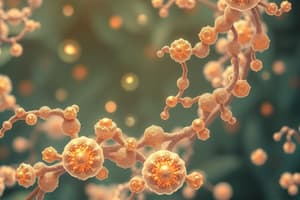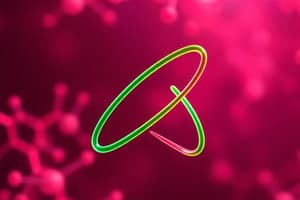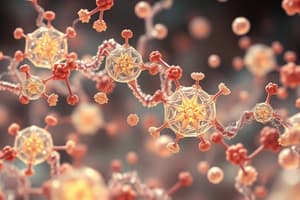Podcast
Questions and Answers
What is the primary function of the cell membrane?
What is the primary function of the cell membrane?
- Protein synthesis
- Energy production
- Regulating transport and maintaining homeostasis (correct)
- Cell division
Which molecules are examples of signaling molecules that enable cell communication?
Which molecules are examples of signaling molecules that enable cell communication?
- Hormones and neurotransmitters (correct)
- Proteins and lipids
- Water and salts
- Carbohydrates and nucleic acids
What role does water play in biochemical reactions?
What role does water play in biochemical reactions?
- Function as a catalyst
- Acts as an insulator
- Provides structural support
- It is a key reactant or product (correct)
What is the importance of buffers in biological systems?
What is the importance of buffers in biological systems?
Which principle is fundamental for understanding the spontaneity of biochemical reactions?
Which principle is fundamental for understanding the spontaneity of biochemical reactions?
What is the primary focus of biochemistry?
What is the primary focus of biochemistry?
Which type of biomolecule is primarily responsible for energy storage?
Which type of biomolecule is primarily responsible for energy storage?
Which of the following is a type of carbohydrate?
Which of the following is a type of carbohydrate?
What is the function of enzymes in biochemical reactions?
What is the function of enzymes in biochemical reactions?
What role do nucleic acids play in living organisms?
What role do nucleic acids play in living organisms?
What characterizes metabolic pathways?
What characterizes metabolic pathways?
Which of the following is NOT a type of lipid?
Which of the following is NOT a type of lipid?
What is an example of a process that involves catabolism?
What is an example of a process that involves catabolism?
Flashcards
Enzyme Inhibition
Enzyme Inhibition
The process by which a molecule binds to an enzyme and prevents or slows down the enzyme's activity. It's a critical way to regulate metabolic pathways and maintain homeostasis.
Cell Membrane
Cell Membrane
A highly organized structure that encloses the cell and controls what enters and exits, crucial for maintaining the cell's internal environment.
Subcellular Organelles
Subcellular Organelles
Specialized units within a cell, each performing specific tasks like energy production, protein synthesis, or waste removal.
Cell Signaling
Cell Signaling
Signup and view all the flashcards
pH
pH
Signup and view all the flashcards
What is biochemistry?
What is biochemistry?
Signup and view all the flashcards
What are carbohydrates?
What are carbohydrates?
Signup and view all the flashcards
What are fatty acids?
What are fatty acids?
Signup and view all the flashcards
What are proteins?
What are proteins?
Signup and view all the flashcards
What are nucleic acids?
What are nucleic acids?
Signup and view all the flashcards
What are metabolic pathways?
What are metabolic pathways?
Signup and view all the flashcards
What are enzymes?
What are enzymes?
Signup and view all the flashcards
What is an active site?
What is an active site?
Signup and view all the flashcards
Study Notes
Introduction to Biochemistry
- Biochemistry studies chemical processes within and relating to living organisms.
- It focuses on biomolecules' structure, function, and composition (proteins, carbohydrates, lipids, nucleic acids).
- Key areas include metabolism, enzyme function, and signal transduction.
- Biochemical understanding is crucial in medicine, agriculture, and biotechnology.
Biomolecules
- Carbohydrates: Essential for energy storage and structural support (monosaccharides, disaccharides, polysaccharides). Structural variety leads to diverse functions.
- Lipids: Hydrophobic molecules vital for energy storage, membrane structure, and hormone signaling (triglycerides, phospholipids, steroids). Fatty acids are a key component.
- Proteins: Essential for cellular functions (catalysts, transport, support). Complex amino acid polymers with diverse structures, dependent on folding for function.
- Nucleic acids: DNA and RNA store and transmit genetic information (nucleotides). DNA carries the genetic code; RNA plays a role in protein synthesis, vital for heredity.
Metabolic Pathways
- Metabolic pathways are interconnected chemical reactions within cells, generating energy, synthesizing biomolecules, and maintaining homeostasis.
- Glycolysis is a central glucose breakdown pathway.
- Cellular respiration completely oxidizes glucose through a series of reactions.
- Photosynthesis converts light energy to chemical energy in specific organisms.
- Anabolism builds complex molecules; catabolism breaks them down.
- Enzymes control reaction rates in each pathway.
Enzymatic Reactions
- Enzymes are biological catalysts, accelerating biochemical reactions by lowering activation energy.
- Enzyme function depends on temperature, pH, and substrate concentration.
- Active sites bind substrates, facilitating reactions.
- Co-factors are sometimes needed for enzyme activity.
- Enzyme inhibition can regulate metabolic pathways.
Cell Structure & Function
- Biochemists study biomolecule interactions within various cellular structures.
- The cell membrane regulates transport and homeostasis.
- Subcellular organelles have specialized functions.
- Protein synthesis is a coordinated biochemical process.
Cell Signaling
- Cells communicate via signaling molecules and pathways (hormones, neurotransmitters).
- Cell surface receptors bind signaling molecules, triggering intracellular responses.
- Signaling processes are crucial for understanding disease mechanisms like cancer and diabetes.
Importance of Water
- Water's unique properties are essential in living systems.
- Polarity makes it a solvent for many biochemical reactions.
- Water is crucial for temperature homeostasis.
- It's a reactant or product in many biochemical reactions.
pH and Buffers
- pH measures hydrogen ion concentration.
- Buffers stabilize pH and prevent cellular environment fluctuations.
- Optimal pH in body fluids is critical for life.
Other Key Concepts
- Thermodynamics governs biochemical reactions.
- Thermodynamics explains energy flow within organisms.
- Free energy changes determine reaction spontaneity.
- Equilibrium applies to diverse biochemical interactions.
Studying That Suits You
Use AI to generate personalized quizzes and flashcards to suit your learning preferences.




